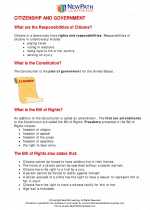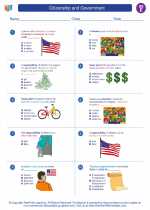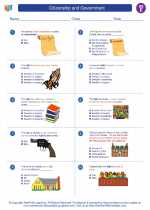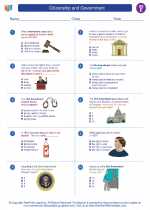Citizenship and Government
Concepts and ideals such as: individual dignity, liberty, justice, equality, individual rights, responsibility, majority and minority rights, and civil dissent. Citizens' rights and responsibilities. Plan of government. Bill of rights. Read More...
◂Social Studies Worksheets and Study Guides Fifth Grade. Citizenship and Government
Study Guide Citizenship and Government
Citizenship and Government  Worksheet/Answer key
Worksheet/Answer key Citizenship and Government
Citizenship and Government  Worksheet/Answer key
Worksheet/Answer key Citizenship and Government
Citizenship and Government  Worksheet/Answer key
Worksheet/Answer key Citizenship and Government
Citizenship and Government 

 Worksheet/Answer key
Worksheet/Answer key
 Worksheet/Answer key
Worksheet/Answer key
 Worksheet/Answer key
Worksheet/Answer key

The resources above cover the following skills:
National Curriculum Standards for Social Studies (NCSS)
POWER, AUTHORITY, AND GOVERNANCE
SOCIAL STUDIES PROGRAMS SHOULD INCLUDE EXPERIENCES THAT PROVIDE FOR THE STUDY OF HOW PEOPLE CREATE, INTERACT WITH, AND CHANGE STRUCTURES OF POWER, AUTHORITY, AND GOVERNANCE.
KNOWLEDGE - Learners will understand:
Rights are guaranteed in the U.S. Constitution, the supreme law of the land.
Fundamental ideas that are the foundation of American constitutional democracy (including those of the U.S. Constitution, popular sovereignty, the rule of law, separation of powers, checks and balances, minority rights, the separation of church and state, and Federalism).
Fundamental values of constitutional democracy (e.g., the common good, liberty, justice, equality, and individual dignity).
PROCESSES - Learners will be able to:
Ask and find answers to questions about power, authority and governance in the region, nation, and world.
CIVIC IDEALS AND PRACTICES
SOCIAL STUDIES PROGRAMS SHOULD INCLUDE EXPERIENCES THAT PROVIDE FOR THE STUDY OF THE IDEALS, PRINCIPLES, AND PRACTICES OF CITIZENSHIP IN A DEMOCRATIC REPUBLIC.
KNOWLEDGE - Learners will understand:
Concepts and ideals such as: individual dignity, liberty, justice, equality, individual rights, responsibility, majority and minority rights, and civil dissent.
Key practices involving the rights and responsibilities of citizenship and the exercise of citizenship (e.g., respecting the rule of law and due process, voting, serving on a jury, researching issues, making informed judgments, expressing views on issues, and collaborating with others to take civic action).
Key documents and excerpts from key sources that define and support democratic ideals and practices (e.g., the U.S. Declaration of Independence, the U.S. Constitution, the Gettysburg Address, the Letter from Birmingham Jail; and international documents such as the Declaration of the Rights of Man, and the Universal Declaration of the Rights of Children).
Key past and present issues involving democratic ideals and practices, as well as the perspectives of various stakeholders in proposing possible solutions to these issues.
PROCESSES - Learners will be able to:
Identify and describe the role of citizen in various forms of government, past and present.
Analyze and evaluate the effectiveness of various forms of civic action influencing public policy decisions that address the realization of civic ideals.
National Standards for Civics and Government (NSCG)
What are civic life, politics, and government? What is civic life? What is politics? What is government? Why are government and politics necessary? What purposes should government serve?
Defining civic life, politics, and government. Students should be able to explain the meaning of the terms civic life, politics, and government. To achieve this standard, students should be able to
Describe politics as the ways people whose ideas may differ reach agreements that are generally regarded as binding on the group, e.g., presenting information and evidence, stating arguments, negotiating, compromising, voting
Necessity and purposes of government. Students should be able to evaluate, take, and defend positions on why government is necessary and the purposes government should serve. To achieve this standard, students should be able to
Evaluate competing ideas about the purposes government should serve, e.g.,
Promoting a particular religion
What are civic life, politics, and government? What are the nature and purposes of constitutions?
Concepts of ''constitution.'' Students should be able to explain alternative uses of the term constitution'' and to distinguish between governments with a constitution and a constitutional government. To achieve this standard, students should be able to
Distinguish among the following uses of the term constitution
Constitution as a document
Constitution as a higher law limiting the powers of government, i.e., a constitutional or limited government
Identify historical and contemporary nations with constitutions that in reality do limit power, e.g., United States, United Kingdom, Germany, Japan, Botswana, Chile
Purposes and uses of constitutions. Students should be able to explain the various purposes constitutions serve. To achieve this standard, students should be able to
Explain how constitutions
Set forth the purposes of government
Describe the way a government is organized and how power is allocated
Define the relationship between a people and their government
Describe historical and contemporary examples of how constitutions have been used to protect individual rights and promote the common good, e.g., United States Constitution ''Congress shall make no law respecting an establishment of religion, (First Amendment) ...,'' ''The right of citizens of the United States to vote shall not be denied...on account of sex (Nineteenth Amendment).''
What are the foundations of the American political system? What is the American idea of constitutional government?
The American idea of constitutional government. Students should be able to explain the essential ideas of American constitutional government. To achieve this standard, students should be able to
Explain essential ideas of American constitutional government as expressed in the Declaration of Independence, the Constitution, and other writings, e.g.,
The people are sovereign; they are the ultimate source of power
The Constitution is a higher law that authorizes a government of limited powers
The purposes of government, as stated in the Preamble to the Constitution, are to form a more perfect union; establish justice; insure domestic tranquility; provide for the common defense; promote the general welfare; secure the blessings of liberty to ourselves and our posterity
Explain how the following provisions of the United States Constitution give government the power it needs to fulfill the purposes for which it was established
Delegated or enumerated powers, e.g., to lay and collect taxes, to make treaties, to decide cases and controversies between two or more states (Articles I, II & III)
The general welfare provision (Article I, Section 8)
The necessary and proper clause (Article I, Section 8, Clause 18)
Explain the means of limiting the powers of government under the United States Constitution
Bill of Rights
Explain how specific provisions of the United States Constitution, including the Bill of Rights, limit the powers of government in order to protect the rights of individuals, e.g., habeas corpus; trial by jury; ex post facto; freedom of religion, speech, press, and assembly; equal protection of the law; due process of law; right to counsel
Evaluate, take, and defend positions on current issues involving constitutional protection of individual rights, such as
Separation of church and state, e.g., school vouchers, prayer in public schools
What are the foundations of the American political system? What are the distinctive characteristics of American society?
Distinctive characteristics of American society. Students should be able to identify and explain the importance of historical experience and geographic, social, and economic factors that have helped to shape American society. To achieve this standard, students should be able to
Explain important factors that have helped shape American society
Religious freedom
A history of slavery
Diversity in American society. Students should be able to evaluate, take, and defend positions on the value and challenges of diversity in American life. To achieve this standard, students should be able to
Explain why conflicts have arisen from diversity, using historical and contemporary examples, e.g., North/South conflict; conflict about land, suffrage, and other rights of Native Americans; Catholic/Protestant conflicts in the nineteenth century; conflict about civil rights of minorities and women; present day ethnic conflict in urban settings
What are the foundations of the American political system? What is American political culture?
American identity. Students should be able to explain the importance of shared political values and principles to American society. To achieve this standard, students should be able to
Explain that an American's identity stems from belief in and allegiance to shared political values and principles rather than from ethnicity, race, religion, class, language, gender, or national origin, which determine identity in most other nations
Identify basic values and principles Americans share as set forth in such documents as the Declaration of Independence, the United States Constitution, the Gettysburg Address
Explain why it is important to the individual and society that Americans understand and act on their shared political values and principles
The character of American political conflict. Students should be able to describe the character of American political conflict and explain factors that usually prevent violence or that lower its intensity. To achieve this standard, students should be able to
Describe political conflict in the United States both historically and at present, such as conflict about
Geographic and sectional interests
Slavery and indentured servitude
The role of religion in American public life
Explain some of the reasons why political conflict in the United States, with notable exceptions such as the Civil War, labor unrest, civil rights struggles, and the opposition to the war in Vietnam generally has been less divisive than in many other nations. These include
A shared respect for the Constitution and its principles
Many opportunities to influence government and to participate in it
What are the foundations of the American political system? What values and principles are basic to American constitutional democracy?
Fundamental values and principles. Students should be able to explain the meaning and importance of the fundamental values and principles of American constitutional democracy. To achieve this standard, students should be able to
Identify fundamental values and principles as expressed in
Basic documents, e.g., Declaration of Independence and United States Constitution
Explain the meaning and importance of each of the following values considered to be fundamental to American public life
Justice
Equality
Openness and free inquiry
Truth
Explain the meaning and importance of the following fundamental principles of American constitutional democracy
Constitutional government which includes the rule of law; representative institutions; shared powers; checks and balances; individual rights; separation of church and state; federalism; civilian control of the military
Conflicts among values and principles in American political and social life. Students should be able to evaluate, take, and defend positions on issues in which fundamental values and principles are in conflict. To achieve this standard, students should be able to
Describe conflicts among fundamental values and principles and give historical and contemporary examples of these conflicts, such as
Conflicts between liberty and equality, e.g., liberty to exclude others from private clubs and the right of individuals to be treated equally
Disparities between ideals and reality in American political and social life. Students should be able to evaluate, take, and defend positions on issues concerning ways and means to reduce disparities between American ideals and realities. To achieve this standard, students should be able to
Identify some important American ideals, e.g., liberty and justice for all, an informed citizenry, civic virtue or concern for the common good, respect for the rights of others
Explain the importance of ideals as goals, even if they are not fully achieved
Explain ways in which discrepancies between reality and the ideals of American constitutional democracy can be reduced by
Individual action
Political action
How does the government established by the constitution embody the purposes, values, and principles of American democracy? How are power and responsibility distributed, shared, and limited in the government established by the United States Constitution?
Distributing, sharing, and limiting powers of the national government. Students should be able to explain how the powers of the national government are distributed, shared, and limited. To achieve this standard, students should be able to
Explain how the three opening words of the Preamble to the Constitution, ''We the People...,'' embody the principle of the people as sovereign--the ultimate source of authority
Sharing of powers between the national and state governments. Students should be able to explain how and why powers are distributed and shared between national and state governments in the federal system. To achieve this standard, students should be able to
Identify the major parts of the federal system
National government
How does the government established by the constitution embody the purposes, values, and principles of American democracy? What does the national government do?
Financing government through taxation. Students should be able to explain the necessity of taxes and the purposes for which taxes are used. To achieve this standard, students should be able to
Explain why taxation is necessary to pay for government
Identify provisions of the United States Constitution that authorize the national government to collect taxes, i.e., Article One, Sections 7 and 8; Sixteenth Amendment
Identify major sources of revenue for the national government, e.g., individual income taxes, social insurance receipts (Social Security and Medicare), borrowing, taxes on corporations and businesses, estate and excise taxes, tariffs on foreign goods
Identify major uses of tax revenues received by the national government, e.g., direct payment to individuals (Social Security, Medicaid, Medicare, Aid to Families with Dependent Children), national defense, interest on the federal debt, interstate highways
How does the government established by the constitution embody the purposes, values, and principles of American democracy? How are state and local governments organized and what do they do?
State governments. Students should be able to explain why states have constitutions, their purposes, and the relationship of state constitutions to the federal constitution. To achieve this standard, students should be able to
Identify and explain the basic similarities and differences between their state constitution and the United States Constitution
Explain why state constitutions and state governments cannot violate the United States Constitution
Organization and responsibilities of state and local governments. Students should be able to describe the organization and major responsibilities of state and local governments. To achieve this standard, students should be able to
Identify major sources of revenue for state and local governments, e.g., property, sales, and income taxes; fees and licenses; taxes on corporations and businesses; borrowing
How does the government established by the constitution embody the purposes, values, and principles of American democracy? How does the American political system provide for choice and opportunities for participation?
Political parties, campaigns, and elections. Students should be able to explain how political parties, campaigns, and elections provide opportunities for citizens to participate in the political process. To achieve this standard, students should be able to
Explain ways individuals can participate in political parties, campaigns, and elections
What is the relationship of the United States to other nations and to world affairs? How has the United States influenced other nations and how have other nations influenced American politics and society?
Impact of the American concept of democracy and individual rights on the world. Students should be able to describe the influence of American political ideas on other nations. To achieve this standard, students should be able to
Describe the impact on other nations of the American Revolution and of the values and principles expressed in the Declaration of Independence and the United States Constitution, including the Bill of Rights
What are the roles of the citizen in American democracy? What is citizenship?
The meaning of citizenship. Students should be able to explain the meaning of American citizenship. To achieve this standard, students should be able to
Explain the important characteristics of citizenship in the United States. Specifically, citizenship
Confers certain rights and privileges, e.g., the right to vote, to hold public office, to serve on juries
What are the roles of the citizen in American democracy? What are the rights of citizens?
Personal rights. Students should be able to evaluate, take, and defend positions on issues involving personal rights. To achieve this standard, students should be able to
Identify the major documentary sources of personal rights, e.g., Declaration of Independence, United States Constitution, including the Bill of Rights, state constitutions
Explain the importance to the individual and to society of such personal rights as
Freedom of conscience and religion
Political rights. Students should be able to evaluate, take, and defend positions on issues involving political rights. To achieve this standard, students should be able to
Identify political rights, e.g., the right to vote, petition, assembly, freedom of press
Explain the meaning of political rights as distinguished from personal rights, e.g., the right of free speech for political discussion as distinct from the right of free speech to express personal tastes and interests, the right to register to vote as distinct from the right to live where one chooses
Identify major statements of political rights in documents such as the Declaration of Independence, United States Constitution, including the Bill of Rights, state constitutions, and civil rights legislation
Explain the importance to the individual and society of such political rights as
Freedom of speech, press, assembly, and petition
Right to vote and to seek public office
Identify and evaluate contemporary issues that involve political rights, e.g., hate speech, fair trial, free press
Economic rights. Students should be able to evaluate, take, and defend positions on issues involving economic rights. To achieve this standard, students should be able to
Identify statements of economic rights in the United States Constitution, e.g., requirement of just compensation, contracts, copyright, patents
Scope and limits of rights. Students should be able to evaluate, take, and defend positions on issues regarding the proper scope and limits of rights. To achieve this standard, students should be able to
Explain what is meant by the ''scope and limits'' of a right, e.g., the scope of one's right to free speech in the United States is extensive and protects almost all forms of political expression. The right to free speech, however, can be limited if and when that speech seriously harms or endangers others
Identify and evaluate positions on a contemporary conflict between rights, e.g., right to a fair trial and right to a free press, right to privacy and right to freedom of expression
What are the roles of the citizen in American democracy? What are the responsibilities of citizens?
Personal responsibilities. Students should be able to evaluate, take, and defend positions on the importance of personal responsibilities to the individual and to society. To achieve this standard, students should be able to
Evaluate the importance of commonly held personal responsibilities, such as
Taking care of one's self
Supporting one's family
Adhering to moral principles
Identify and evaluate contemporary issues that involve personal responsibilities, e.g., failure to provide adequate support or care for one's children, cheating on examinations, lack of concern for the less fortunate
Civic responsibilities. Students should be able to evaluate, take, and defend positions on the importance of civic responsibilities to the individual and society. To achieve this standard, students should be able to
Evaluate the importance of commonly held civic responsibilities, such as
Obeying the law
Respecting the rights of others
Deciding whether and how to vote
Evaluate the importance for the individual and society of fulfilling civic responsibilities
Identify and evaluate contemporary issues that involve civic responsibilities, e.g., low voter participation, avoidance of jury duty, failure to be informed about public issues
What are the roles of the citizen in American democracy? What dispositions or traits of character are important to the preservation and improvement of American constitutional democracy?
Dispositions that enhance citizen effectiveness and promote the healthy functioning of American constitutional democracy. Students should be able to evaluate, take, and defend positions on the importance of certain dispositions or traits of character to themselves and American constitutional democracy. To achieve this standard, students should be able to
Explain the importance to the individual and society of the following dispositions or traits of character
Individual responsibility--fulfilling the moral and legal obligations of membership in society
What are the roles of the citizen in American democracy? How can citizens take part in civic life?
Forms of political participation. Students should be able to describe the means by which Americans can monitor and influence politics and government. To achieve this standard, students should be able to
Explain how Americans can use the following means to monitor and influence politics and government at local, state, and national levels
Voting
Knowledge and participation. Students should be able to explain the importance of knowledge to competent and responsible participation in American democracy. To achieve this standard, students should be able to
Evaluate the claim that constitutional democracy requires the participation of an attentive, knowledgeable, and competent citizenry
National Content Standards in Economics (NCSE)
Role of Government and Market Failure
Students will understand that there is an economic role for government in a market economy whenever the benefits of a government policy outweigh its costs. Governments often provide for national defense, address environmental concerns, define and protect property rights, and attempt to make markets more competitive. Most government policies also have direct or indirect effects on people’s incomes. Students will be able to use this knowledge to identify and evaluate the benefits and costs of alternative public policies, and assess who enjoys the benefits and who bears the costs.
At the completion of Grade 8, students will know the Grade 4 benchmarks for this standard, and also that:
Most federal government tax revenue comes from personal income and payroll taxes. Payments to Social Security recipients, the costs of national defense and homeland security, medical expenditures (such as Medicare), transfers to state and local governments, and interest payments on the national debt constitute the bulk of federal government spending.
At the completion of Grade 8, students will use this knowledge to:
Compare the various sources of state and local revenues and various categories of state and local expenditures in their state and community with those of the U.S. federal government.
National Center for History in Schools (NCHS)
Historical Thinking Standards
Historical Comprehension
Reconstruct the literal meaning of a historical passage.
United States History Content Standards
Era 3: Revolution and the New Nation (1754-1820s)
The institutions and practices of government created during the Revolution and how they were revised between 1787 and 1815 to create the foundation of the American political system based on the U.S. Constitution and the Bill of Rights.
The student understands the guarantees of the Bill of Rights and its continuing significance.
Era 4: Expansion and Reform (1801-1861)
How the industrial revolution, increasing immigration, the rapid expansion of slavery, and the westward movement changed the lives of Americans and led toward regional tensions.
The student understands the rapid growth of "the peculiar institution" after 1800 and the varied experiences of African Americans under slavery.
World History Content Standards
Era 7: An Age of Revolutions, 1750-1914
The causes and consequences of the agricultural and industrial revolutions, 1700-1850.
The student understands the causes and consequences of the abolition of the trans-Atlantic slave trade and slavery in the Americas.